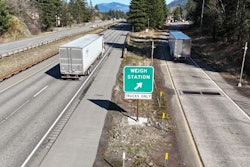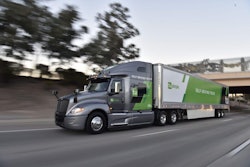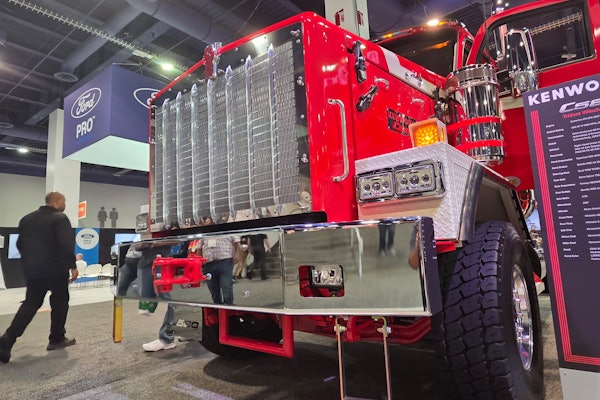Trucking news and briefs for Wednesday, July 16, 2025:
Early-stage 2026 DOT appropriations bill includes parking funding, speed limiter ban
The first draft of the fiscal year 2026 Transportation, Housing and Urban Development, and Related Agencies (THUD) appropriations bill has been released and approved by the House THUD Subcommittee, clearing the way for the bill to be marked up Thursday by the full House Appropriations Committee.
Overall, the bill provides a total discretionary allocation of $89.91 billion for the covered departments, which is $4.458 billion (4.7%) below the fiscal year 2025 enacted level.
Should the bill pass with current provisions intact, among the funds allocated to the Department of Transportation -- specifically for the Federal Highway Administration -- is $200 million for public truck parking. The bill would require that the parking projects “be within reasonable access to or in the right of way of an Interstate highway, the National Highway System, or the National Highway Freight Network.”
The bill would also ban projects funded by the allocated funds from charging fees to commercial vehicle drivers to access the parking. Funding would also not be allowed to be used for the construction or development of charging or fueling infrastructure.
Among the total $89.91 billion appropriated in the bill, the Federal Motor Carrier Safety Administration would receive $927 million, which is $21 million above the FY25 enacted level.

Under the provisions of the bill, no funds allocated to FMCSA would be allowed to be used to promulgate a rule or regulation to require heavy trucks to be equipped with speed limiting devices set to a maximum speed. DOT Secretary Sean Duffy last month signaled that FMCSA will withdraw its existing speed limiter proposal.
The bill also bans the use of funds to require the use of electronic logging devices for CMVs transporting livestock or insects -- an exemption that has been in place since the implementation of the ELD rule.
It would also continue the prohibition of a requirement for driver-facing cameras to register an apprenticeship program with the Department of Labor as a condition for participation in the Safe Driver Apprenticeship Pilot Program.
Finally, the bill would protect the federal preemption determination as regards California’s meal and rest break rule.
[Related: Truck parking, autonomous trucking, ELP: DOT Secretary Duffy weigh in at Congressional hearing]
House bill would add positive hair drug tests to FMCSA Clearinghouse
A bill introduced in the U.S. House would direct the Federal Motor Carrier Safety Administration (FMCSA) to add a positive hair test result to its current definition of an employer’s "actual knowledge" of a truck driver’s drug use.
The bill, titled “The Drug and Alcohol Clearinghouse Public Safety Improvement Act,” would require motor carriers to promptly submit to FMCSA’s Drug and Alcohol Clearinghouse any record of a positive hair drug test result from a preemployment drug test or a random drug test that is administered through a covered device. Under terms of the legislation, any hair drug test submitted to the Clearinghouse must be from a laboratory that is accredited by the College of American Pathologists for forensic hair drug testing and that incorporates, if available, Department of Health and Human Services scientific and technical guidelines for hair testing.
[Related: Marijuana legalization, trucking, and the future of drug testing]
Introducing the legislation, Rep. Rick Crawford of Arkansas said that “Arkansas’s trucking industry relies on safe and efficient policies that keep our roads safe for all users of the road. Allowing U.S. motor carriers to use positive hair test results as actual knowledge for pre-employment purposes not only creates a more reliable way for drug testing but also creates a more equitable process for hiring truck drivers.”
Crawford added that the bill “enables employers to know if a licensed commercial truck driver job applicant has previously failed a hair test for illegal drug use. Removing known controlled substance users from behind the wheel of commercial motor vehicles will make our nation’s roads safer for everyone.”
Crawford noted that several trucking companies already screen applicants with hair drug tests, but this bill would allow those tests to be submitted to FMCSA’s Clearinghouse. Motor carriers would still be required to administer a pre-employment urine drug tests.
Trucker named Highway Angel for stopping at deadly, head-on crash scene
Ashley Smith, a Cisco, Texas-based truck driver for Decker Truck Line, has been named a Highway Angel by the Truckload Carriers Association for stopping and trying to help victims of an early-morning crash in Arizona.
 Ashley Smith
Ashley Smith
Demonstrating a high level of composure and professionalism, Smith safely positioned her vehicle, ensured her own safety, and jumped into action.
“I got out of the truck, I called 911,” said Smith. “The silver car basically started to catch fire and caught fire to the other one before anybody could get there.”
Smith did her best to try to extinguish the fire and used her flashlight to try to alert drivers to the deadly crash, putting herself at risk directing traffic.
“I didn’t want somebody to hit the two cars that were there, and in the process I almost got hit by a semi that was not paying attention,” Smith said. “I had to dive off the highway.”
Unfortunately, all five people involved in the crash were pronounced dead at the scene. Smith’s actions that day were not only selfless but went unspoken -- she did not report the incident to her team. It was only brought to light when law enforcement reached out to Decker Truck Line for possible dashcam footage. A trooper involved in the investigation specifically acknowledged Smith’s helpfulness in his follow-up, which highlighted her instinctive drive to serve and protect without seeking recognition.
“I was just doing what I hoped anyone would do,” she said.








